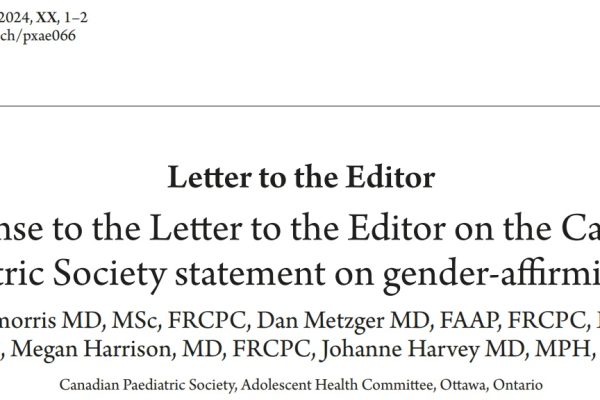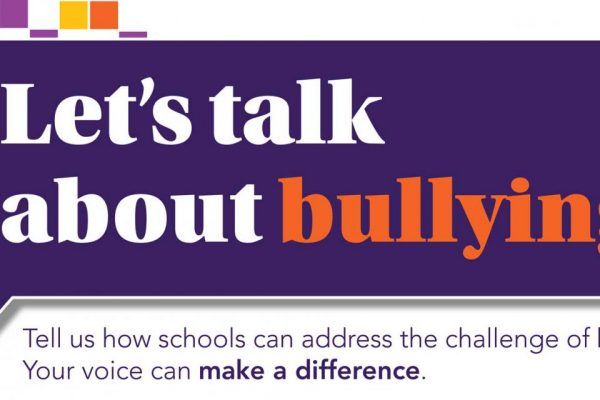I lost faith in Canadian journalism the way people go bankrupt: gradually and then all at once.
The all-at-once part happened following the release of the Cass Review in England. This extensive independent review, published in early April, took four years, spanned nearly 400 pages and found “remarkably weak evidence” to support the use of puberty blockers and hormone treatments for children who feel distress related to their gender. Unfortunately, such “gender-affirming care” has been the approach for about a decade in many Western countries, including Canada.
Nearly a week later, the CBC published an article dismissing the findings of the Cass review, describing it as “misleading” and suggesting it was “politically motivated” and may “have come from a place of bias.” The Canadian doctors interviewed shared anecdotal evidence to say that puberty blockers can improve the quality of life for some teens, contrary to the peer-reviewed systematic review published in the BMJ in conjunction with the Cass Review’s final report.
The CBC’s approach is activism, not journalism. I know that because, before leaving journalism for the greener pastures of corporate communications, I spent nearly 20 years working as a daily news reporter. Journalism is supposed to be about gathering facts, without fear or favour. The best journalism comes from challenging the narrative being told to us. To do that requires asking difficult questions and finding out what’s really happening out there.
Journalism is supposed to be about gathering facts, without fear or favour. The best journalism comes from challenging the narrative being told to us. To do that requires asking difficult questions and finding out what’s really happening out there.
For several years now in Canada, we have been told that when young people question or feel distress about their gender, the best way to help them is to use opposite sex pronouns and possibly a new name, and that they are likely to need puberty blockers, surgery and hormones to help them become their true selves. I am part of a small group of Canadian parents who have personal and professional concerns about the way the mainstream media has championed this one-size-fits-all approach.
I am part of a small group of Canadian parents who have personal and professional concerns about the way the mainstream media has championed this one-size-fits-all approach.
Since about 2021, our group has been writing to reporters and editors, urging them to broaden their coverage on issues related to teens and gender identity. Many of us describe ourselves as lifelong lefties, supporters of gay marriage, LGBT rights, and left-leaning Canadian media. We are concerned about the sudden spike in the number of young people experiencing gender dysphoria and identifying as transgender, the pressure on parents to automatically affirm their new identity, and the approach by educators to support pronouns and preferred names, even if that means keeping information secret from parents.
We have been asking mainstream media to take a closer look at why countries such as England, France, Denmark, Sweden, and Finland, have been pulling back on their affirmative approach, and have taken steps to limit minors’ access to medical treatment. These countries have followed mounting concerns, including personal testimony from young adults who have halted their gender treatment and returned to their birth sex (known as detransitioning), that transition may be doing harm while it purports to help.
Our group has written more than 100 letters in the past three years. Most have received no response. This is disappointing, but not all that surprising given short-staffed newsrooms. Sometimes the reporters wrote back with explanations about a lack of expertise, or time.
Spoiler alert: the National Post has been the only major media outlet in Canada that doesn’t shy away from reporting on this issue. It’s the left-learning media that won’t budge.
One CBCer wrote back to a parent to explain that, “As journalists, we aren’t equipped to rule on matters of social and medical policy. There are experts in the field who do that work. Our role is to report on their work, which we have and will continue to do, recognizing there is not universality of opinion.”
Another suggested that because of the five-to-eight minute format of radio segments “there are limits to how much ground can be covered — particularly on such a complex, layered and evolving topic.”
Of the times when news organizations did respond, reporters and editors suggested that their role is to advocate for trans people facing discrimination. They also suggested that growing concerns about teens, pronouns, and schools are connected to right-wing influences from the U.S. We got similar responses from the Toronto Star, the Globe & Mail, and the CBC, dismissing our concerns as partisan, backlash or motivated by right-wing transphobia.
“Our editorial position has been motivated by the backlash trans individuals have faced. It’s becoming a partisan issue in the U.S. and unfortunately that has spilled over here and we’ve seen the trans community in particular targeted,” a Toronto Star editor explained.
And “But of course, the issue is not black and white. There are nuances and dynamics unique to each individual and situation. Some of the conversation has been hijacked by people with other agendas.”
In one exchange, the Globe & Mail explained that its coverage focused on “a specific cohort of parents who’ve been politicized, particularly in SK, NB and now Alberta, through the parents’ rights movement. This movement expands past consent on social transitioning at school, to barring a wider net of education on LGBTQ rights from sex ed and school more broadly. It has deeply homophobic overtones and merits reporting on.”
In these provinces, “conservative premiers have made parents’ rights and eradicating “gender ideology” from schools their vocal priority,” the reporter wrote.
A parent who wrote to the CBC with her concerns received a lengthy reply that assured her that “there can be no doubt that transgender issues are of profound concern to many Canadians. And there can be no doubt that those issues are controversial and exceedingly complex, so complex that it would be impossible to incorporate into a single story or program every perspective that is potentially relevant, let alone every piece of evidence supporting or contradicting those perspectives.”
CBC has an “obligation to provide balance over time,” the editor wrote. “I can assure you we have done so, and will continue to do so; this piece is part of our ongoing coverage of issues around rights and identity for trans, non-binary, gender non-conforming people.”
As evidence of balanced coverage, CBC editors provided links to personal essays from its CBC’s First Person section, which included a non-binary trans women who became a sex worker, a gender queer person who had a mastectomy, a black queen non-binary person who performs drag, a queer man who is Vietnamese, a queer woman who lives in rural interior B.C. and an 11-year-old Indigenous girl who uses they/them pronouns.
As evidence of balanced coverage, CBC editors provided links to personal essays from its CBC’s First Person section, which included a non-binary trans women who became a sex worker, a gender queer person who had a mastectomy, a black queen non-binary person who performs drag, a queer man who is Vietnamese, a queer woman who lives in rural interior B.C. and an 11-year-old Indigenous girl who uses they/them pronouns.
These essays may be diverse in the sense that they were written by various people. But where exactly is the complexity and balance when they all illustrate support for pronouns and gender identity?
One parent suggested that CBC interview a Canadian woman who detransitioned and is the first in the country to sue her doctors for medical malpractice and a transwoman who has applied for MAID due to complications from gender surgery. (The National Post has reported on both). The CBC responded that these people “are free to pitch their stories” to the First Person section.
Simply put, that is not good enough. These two instances, detransition and extreme complications, suggest that sometimes gender treatment can go wrong, and that should be of concern to all Canadians. What happened in these cases should be scrutinized and verified through reporting, not told through a first-person essay.
Another parent contacted a Globe & Mail reporter whom she knew personally for many years. She shared that her daughter’s school staff socially transitioned the girl to a male gender identity without consulting or telling her or her husband. The girl initially asked for a double mastectomy and hormones, but then changed her mind. The mother asked the reporter if she could explain the details of this story on background, to give the reporter a fuller picture of what teens and families experience.
The reporter’s response: “You mentioned initially you wanted to speak off the record, so I’m not certain what you had in mind when you are bringing this to the Globe; we can’t do much with off the record material. I also won’t personally be able to cover it because I know you. If you’d like, I can speak with my editor, who helmed Xtra for many years and is well versed on these issues, on possibilities here.”.
“Given how articulate you are on the issue, and given these issues are top of mind for many parents, you could pitch your story as an Opinion piece, if you in fact seek to go public.”
This response is troubling for a couple of reasons. First, there’s the clear implication that the editor, having spent many years at Xtra, an online activist LGBTQ magazine, knows what’s best when it comes to gender-questioning young people.
After all, we’re told that the science is settled. Xtra’s Editorial Standards and policies state that it “refrains from presenting multiple points of view if one perspective on an issue has been credibly established and settled as fact. We avoid ‘false balance’ and we never debate or question the humanity of any person or identifiable group.” Presumably this approach would continue to be a guiding principle for this Globe editor.
Is this reporter correct in saying that she wouldn’t be able to write anything because of the personal relationship with this parent? Yes, for sure. But this parent wasn’t asking for her daughter’s story to be published in the Globe & Mail. She offered to speak on background, about a very difficult topic that happens to be in the news. There’s nothing that prohibits reporters from having conversations about current events with family or friends. You might even call it “talking to regular people in real life.”
Why would this reporter say she “can’t do much” with off-the-record material? That’s a shame because talking to people on background is one way that inquisitive reporters can find out what’s actually happening in the world. Here’s just one example: In April, Adam Zivo, a freelance journalist and weekly columnist for the National Post, meticulously described in an article in The Line how he developed his ground-breaking story about safer supply drugs being sold on the black market. He spoke with more than a dozen specialists, deeply concerned about the situation, and “distinguished leaders in their field” – yet they initially refused to speak on the record, fearful of professional retaliation and cyberbullying.
Secondly, talking to people on background is one way that inquisitive reporters can find out what’s actually happening in the world. In this space last month, Adam Zivo described how he developed his ground-breaking story about safer supply drugs being sold on the black market. He spoke with more than a dozen specialists, deeply concerned about the situation, and “distinguished leaders in their field” – yet they initially refused to speak on the record, fearful of professional retaliation and cyberbullying.
Parents, remember, are just regular people. And those of us who have children in this situation are desperate – we are trying to find the most sensible way to help our kids through their distress, which can involve potentially life-altering decisions. We love our kids and we’re trying to keep our relationship with them strong, while protecting our privacy. We’re trying to keep our sanity in a world that seems to be pushing gender identity down to younger and younger children. We’re holding down jobs and managing other family relationships while also trying to get the media’s attention long enough to explain that there’s more going on here than meets the eye.
And yet somehow, these Canadian reporters and editors who care about the well-being of gay, lesbian and transgender young people insist that the burden of proof of potential harm resulting from relentless cheerleading on gender affirming medical treatment – already discredited in many other countries – is on us. If parents won’t or can’t “go public” with our concerns, what can they possibly do?
[these Canadian reporters and editors] insist that the burden of proof of potential harm resulting from relentless cheerleading on gender affirming medical treatment is on us.
If parents won’t or can’t “go public” with our concerns, what can they possibly do?
So, what can they do? They could talk to other professionals who work with children – teachers, doctors, or psychologists to find out if they share the obvious concerns. How about showing some curiosity and asking questions about what could be driving the huge increase in the number of teenage girls who are showing up at gender clinics? Could social media be a factor? (The National Post has recently written about these topics.)
Here’s a good place to start. Recently French Radio-Canada conducted an investigation. Led by investigative journalist Pasquale Turbide, Enquete hired a young actress to go to a private medical clinic and she got a prescription for testosterone in under 10 minutes. There was no discussion of possible side effects. The 14-year-old girl simply received a prescription for 30 mg of testosterone to be injected every week.
As expected, there was pushback.
Radio-Canada’s headquarters in Montreal had its windows smashed a few days after the Enquete report aired. Activists released a statement saying the report amplified “transphobic rhetoric.”
And apparently, other media outlets were encouraged to bury the report, according to an article in LaPresse. “Several days before its broadcast, on February 29, various media outlets had not only been alerted, but encouraged to demolish the Enquête report … before even having seen it. They had been warned that Radio-Canada was preparing to offer a platform to the transphobic far right,” Isabelle Hachey wrote in an editorial.
And yes, we parents sent links to this investigation to CBC, asking them to simply air the report done by their French counterparts.
No answer.
There may yet be some evidence the tide is turning. Recently, the Globe & Mail published an opinion column that included mention of the Cass Review as it explained that other countries are changing their approach to gender treatment for minors. It warns that Canada is becoming an outlier and that our children deserve an approach that carefully considers the evidence. Time will tell whether it’s too little too late, but it’s a long overdue start.
Meanwhile, as left-leaning Canadian media takes its sweet time on balanced reporting on this contentious topic, more children suddenly identify as trans, with no prior history of gender nonconformity, and more parents are kept ignorant of the growing international evidence base that clearly signals gender affirmation isn’t everything it’s cracked up to be.




